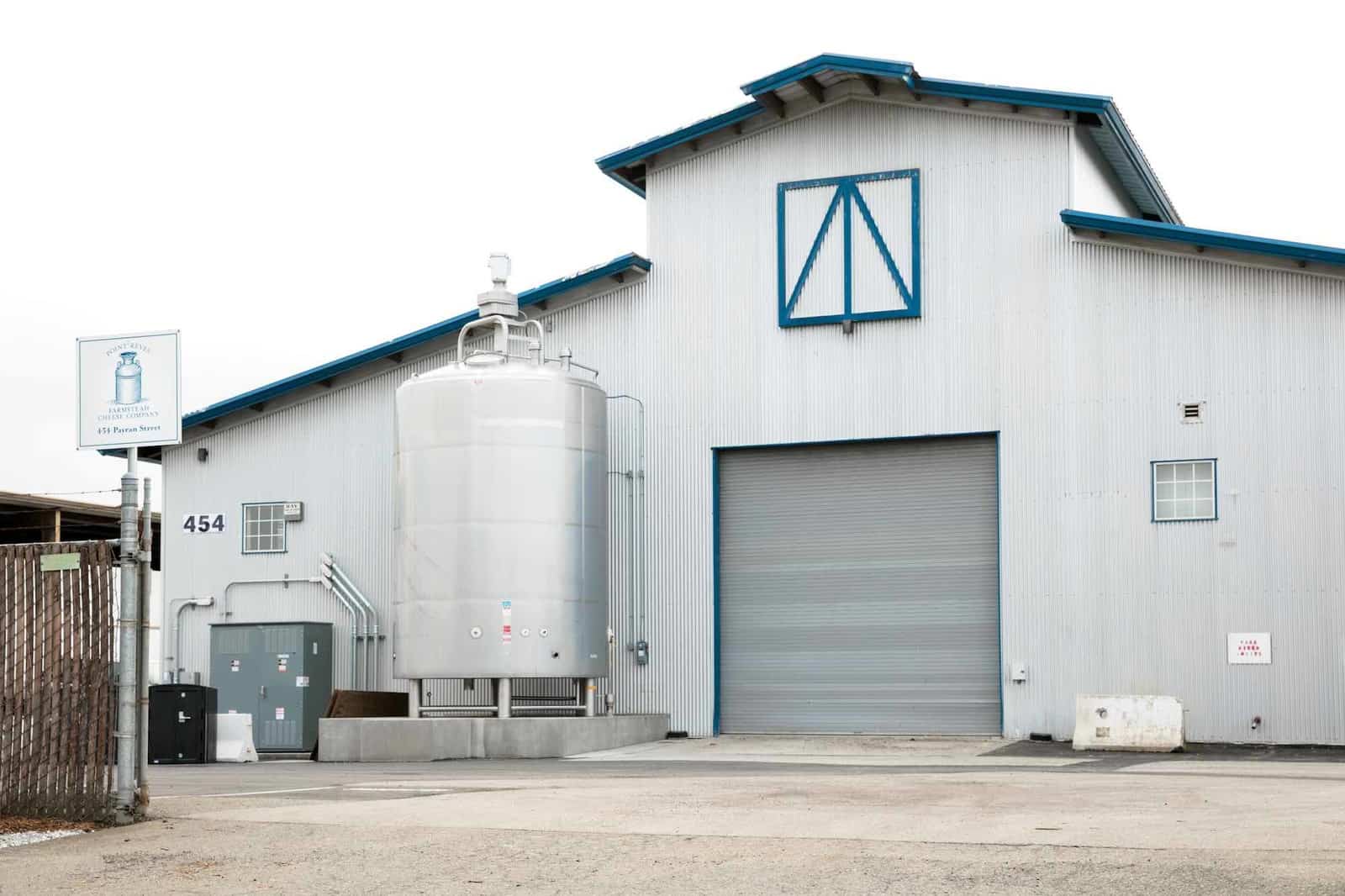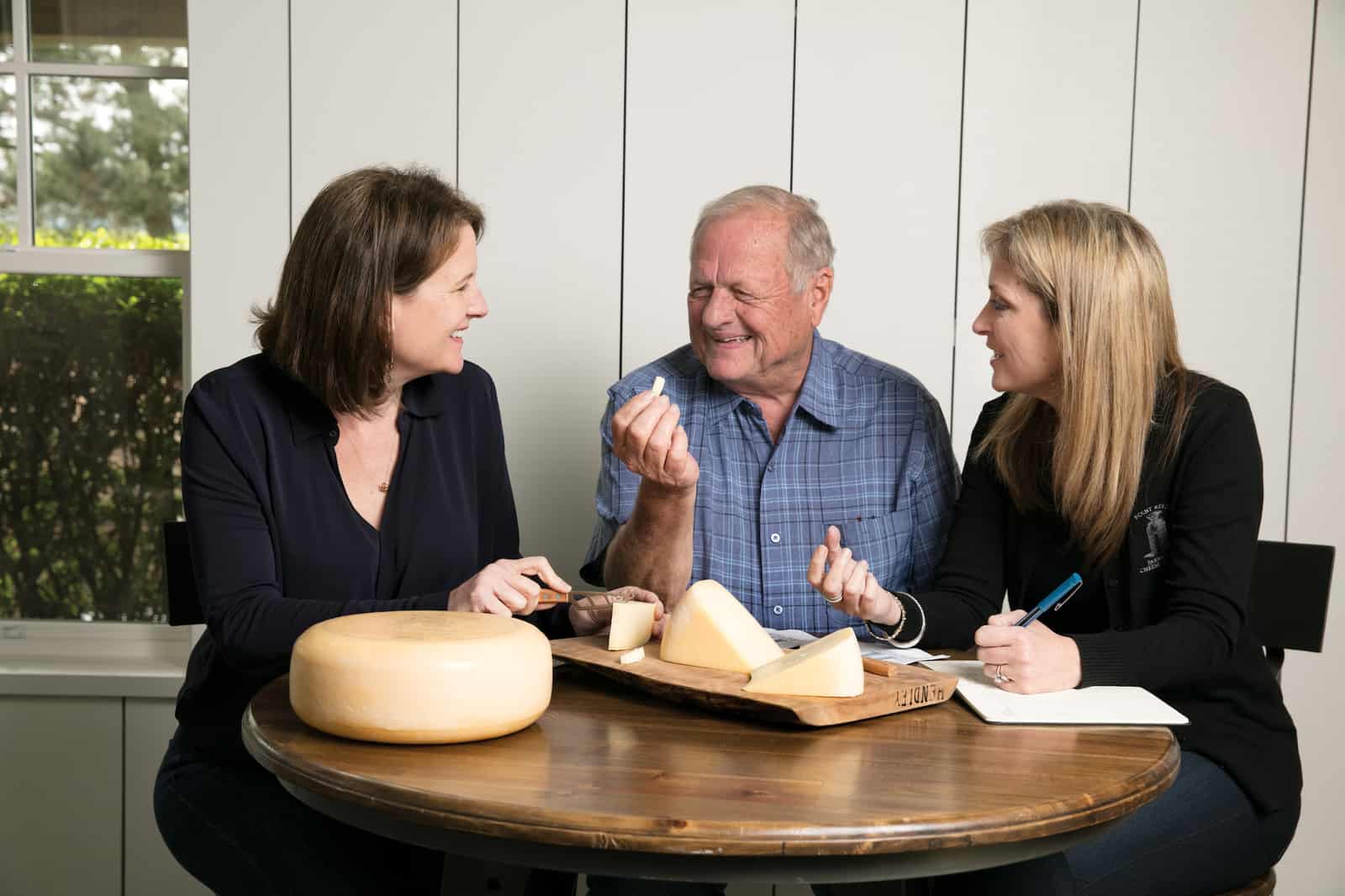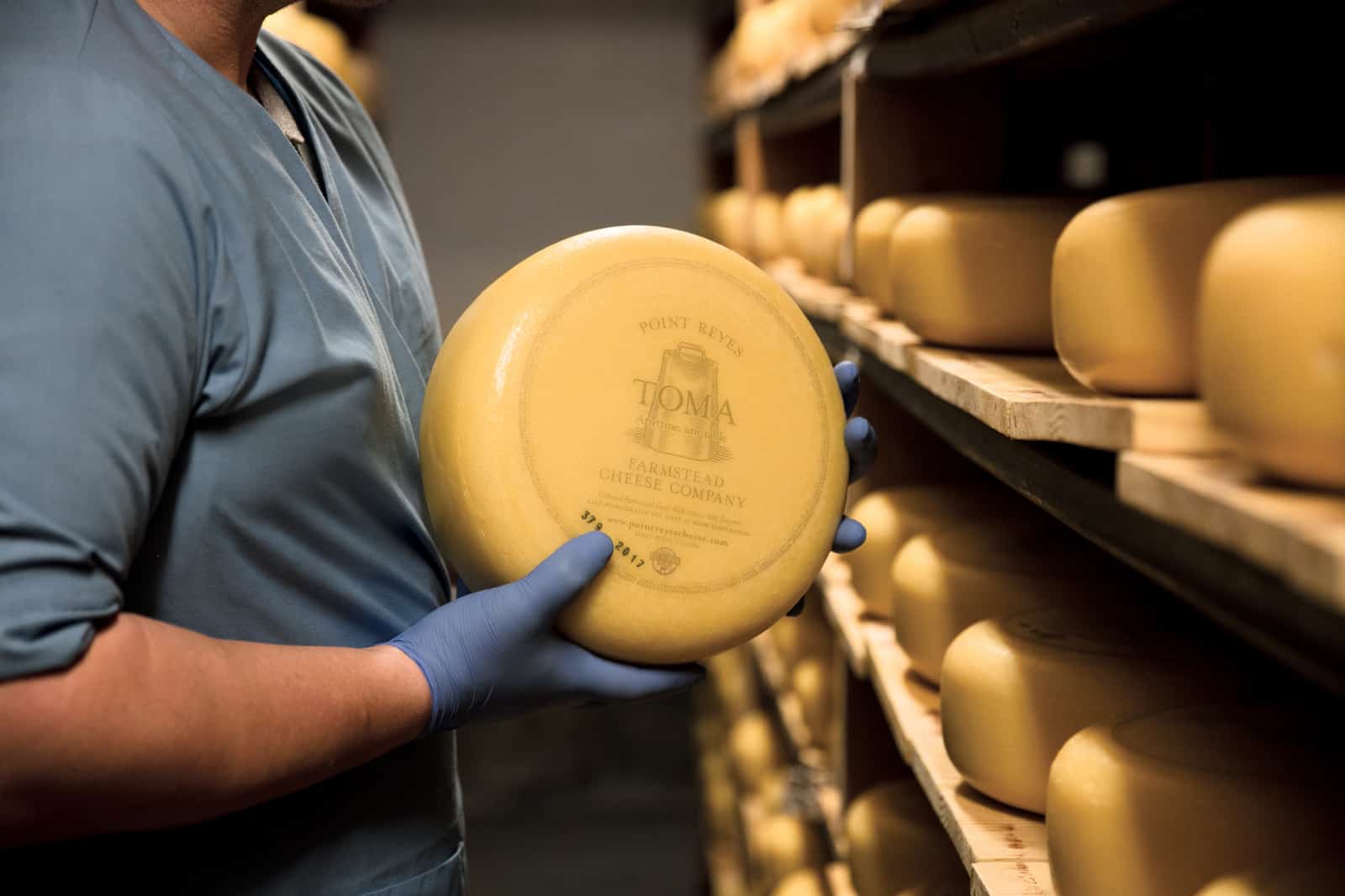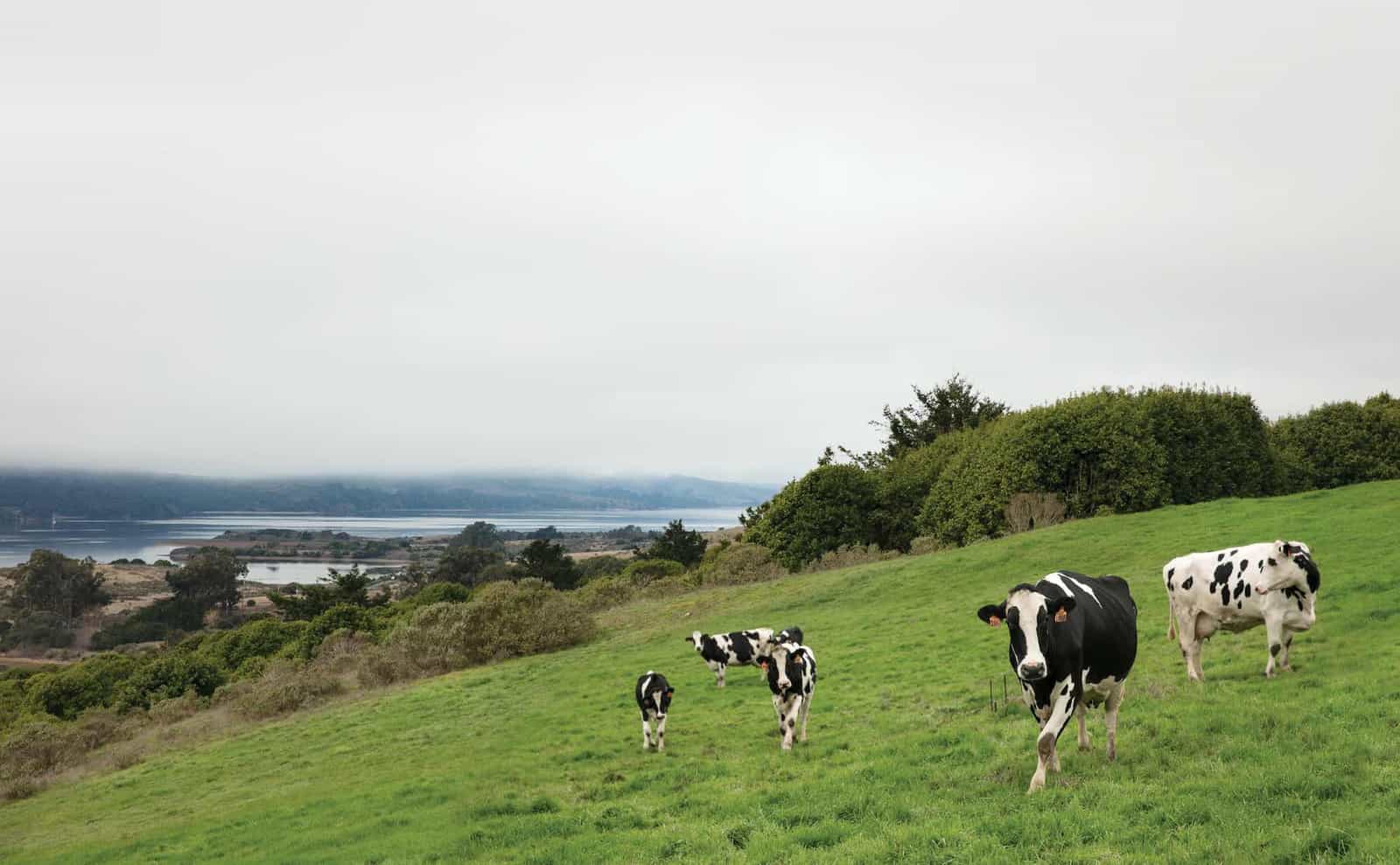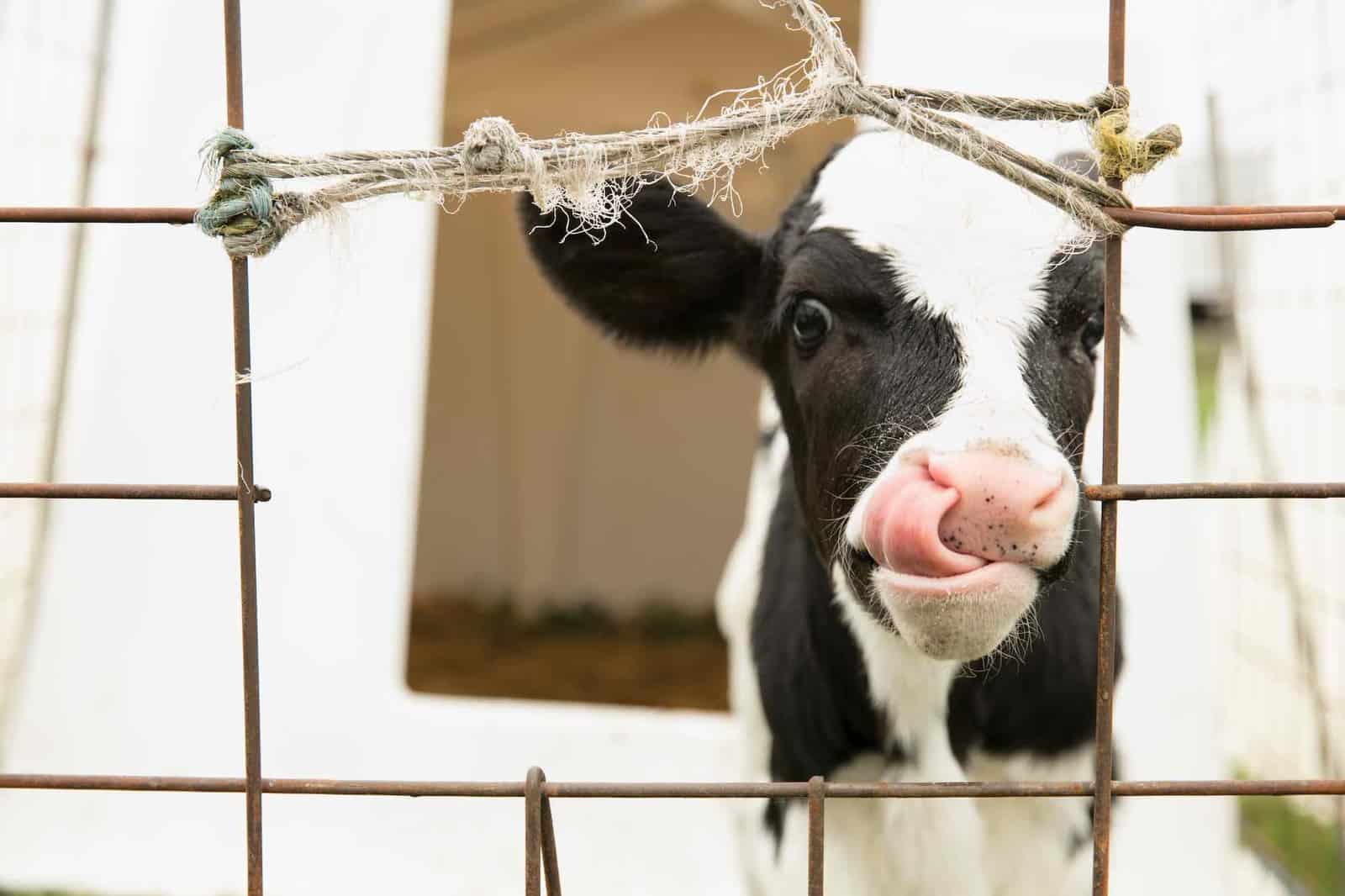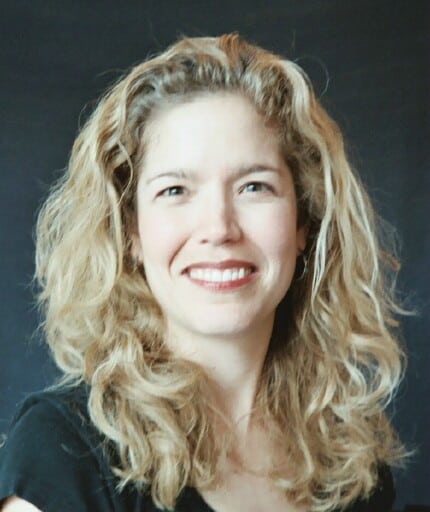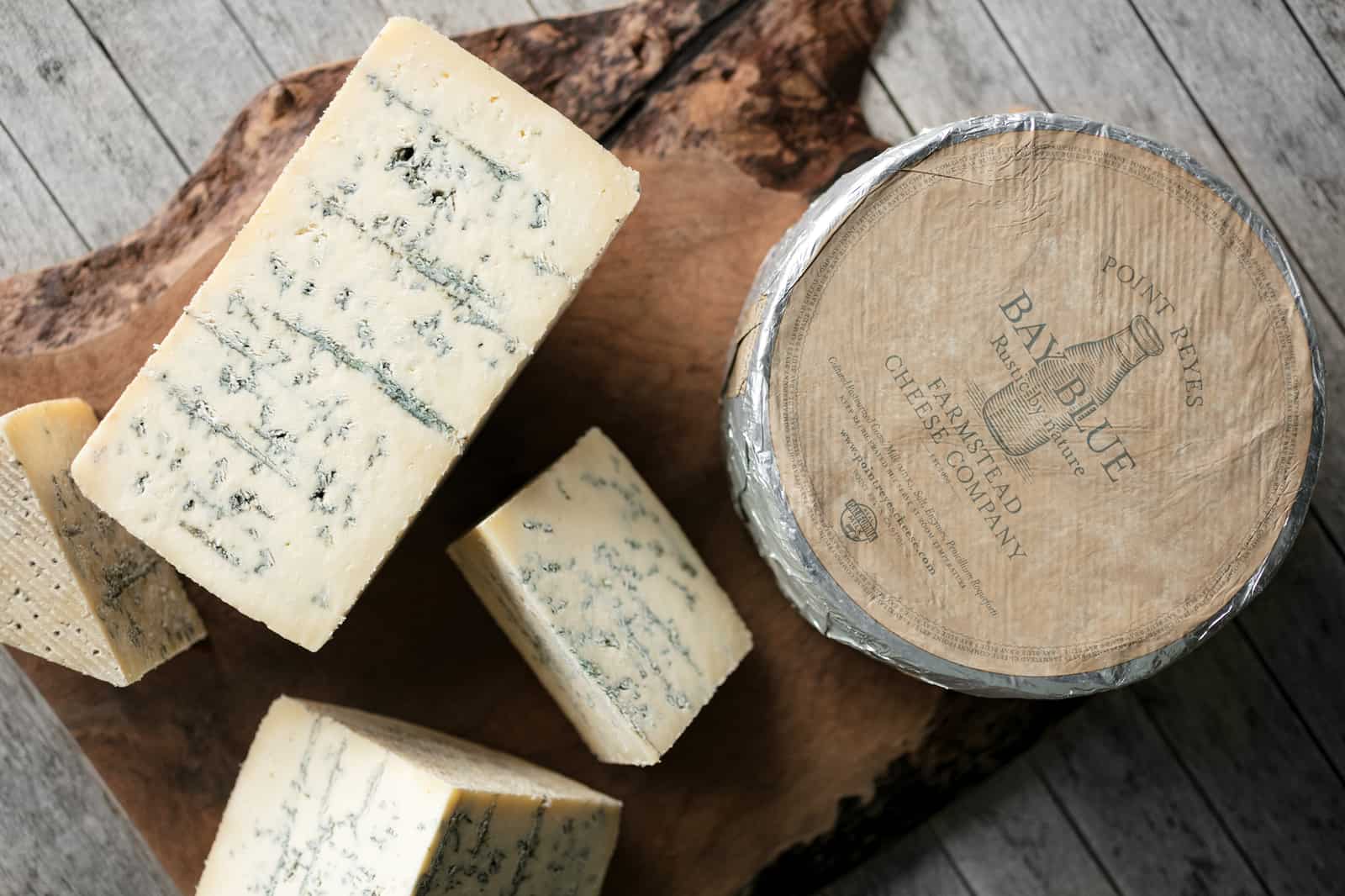
On a chilly, fog-shrouded morning, it’s easy to miss the turnoff for Point Reyes Farmstead Cheese Company. Nestled among the rolling hills of Marin County, approximately 45 miles north of San Francisco, the farm and creamery are situated out of view of the region’s main thoroughfare. Here, above the long, blue stretch of Tomales Bay, the air is scented with wild fennel and sage and the occasional whiff of saltwater.
Enter the property and follow the mile-long driveway as it dips and swells until you see the long row of swishing tails, the farm’s Holstein herd. Now the air smells more distinct, of mud and barnyard and—once the sun comes out—oyster shells and grass. Point Reyes Farmstead Cheese Company is the most recent venture from the Giacomini family, who first started ranching in the region before the great San Francisco earthquake of 1906.
Two generations later, in 1959, Bob and Dean Giacomini purchased the family dairy and built a reputation around delicious milk that contained those distinct, only-in-West-Marin aromatics.
From Dairy to Creamery
Though dairying has a long history in the region, adding more cows to grow Point Reyes was not an option. “We were always limited by land and water resources, and therefore the number of cows we could raise on the property,” says Jill Giacomini Basch, the business’ chief marketing officer.
So, diversification was the only way to build on what their ancestors started. Bob and Dean had raised their four daughters on the farm, but the Giacomini sisters were widely scattered by the 1990s, pursuing individual careers and developing their own lives. But after many discussions around the family table, Jill, Lynn, and Karen were convinced returning to the farm could help grow their careers.
“We had the legacy, yes,” says Giacomini Basch, “[but the question was] how will coming home fulfill and sustain each of us individually?” The answer lay in the next phase of the family business: cheese.
Point Reyes Farmstead Cheese Company was launched in 2000. At that point, the family had a broad sweep of a plan but no specifics. “We called everyone to learn from them,” says Giacomini Basch, who reached out to Point Reyes neighbors Peggy Smith and Sue Conley at Cowgirl Creamery, Jennifer Bice at Redwood Hill Farm in nearby Sonoma, and Mary Keehn at Cypress Grove in California’s Humboldt County, among others.
“Peggy and I did act as a sounding board for the Giacominis in the early days,” says Conley. “We were excited by their ideas and did whatever we could to help them understand the landscape of making and selling artisan cheese in the United States.” Step by step, a business plan and a vision were put into place, and each sister found their role. Today, Lynn serves as the chief operations officer, and the fourth sister, Diana, came on board in 2009 as chief financial officer (Karen is no longer with the company).
In those early days, the family realized that modernizing the dairy was crucial in order to support the farm’s limited resources. Farmers may be known for their thriftiness, but water conservation and management for a California farm is serious business. Though the dairy can access municipal water, the family looked for ways to improve on-property water storage. They built aboveground storage ponds and installed irrigation and well systems to capture, recycle, and treat water. “We get three uses out of every drop,” says Giacomini Basch, who understands that maximizing natural resources is key to the farm’s sustainability in the drought-prone Golden State.
Winners of the 2013 Leopold Conservation Award—which recognizes private landowner achievement in the voluntary stewardship and management of natural resources—the Giacomini family continues to innovate and invest in the business. A no-till drill system prevents soil runoff. An on-site digester converts whey into renewable energy. All solid waste produced by the farm is composted for reuse as fertilizer. These efforts are not only crucial for the long-term viability of the farm, but they also contribute to the family’s mission to make great cheese in the unique place they call home, cheese that best represents the flavor of their milk.
Cheese Evolution
The now-iconic Original Blue is the cheese that got it all started. Made only with farmstead milk and aged for three and a half months, the cheese is a perennial favorite, winning awards since its launch in 2000 (most recently a 2017 Good Food Award). Sixty-five percent of the creamery’s sales still come from Original Blue, says Giacomini Basch. The company— with the help of four cheesemakers, including head cheesemaker and plant manager Kuba Hemmerling—has grown steadily and organically in the last 17 years, self-funding new projects and products to match their entrepreneurial vision.
Recognizing that all the sisters were interested in the culinary arts (and that their Original Blue is beloved among chefs), the team launched The Fork in 2010. In a custom-built facility located at the heart of the family dairy, The Fork offers farm tours, culinary classes, focused tastings, and dinners to help visitors understand what goes into making cheese as well as how to use Point Reyes cheese in their own cooking. The food is served family-style and is, naturally, farm-to-table. Where better to experience a farm’s terroir than on the farm itself?
As production has grown, the number of cheeses has similarly expanded. Point Reyes now produces a range of wheels, including Toma, a firm waxed rind; Bay Blue, a milder Stilton style; Gouda; and a seasonal mozzarella in addition to Original Blue. The cheeses have proven so popular that the sisters—now co-owners of the business—are expanding production again.
This time, they’re opening a production and distribution facility in more centrally located Petaluma to satiate some of the demand for their cheeses. The farm’s creamery currently supports two 500-gallon vats; the new Petaluma location will add two 1,000-gallon vats to their lineup, effectively doubling production capability.
All packaging and distribution will take place in the Petaluma facility, too, and it will also turn out the company’s pasteurized cheeses: mozzarella, Toma, Bay Blue, and Gouda. (Original Blue will remain a raw-milk, farmstead cheese.) Once the new facility debuts in early 2018, Giacomini Basch hopes for year-round mozzarella production as well. “The mozzarella really shows off our milk’s flavor,” she says. “It showcases the purest flavors and characteristics.”
Slow and Steady
Though the family is investing in modern technologies, Giacomini Basch insists that all the cheeses will continue to be made by hand with local milk sourced from North Bay cows. Keeping their supply chain 100 percent transparent is also a goal of Point Reyes—with a new racking system, inventory tracking system, and GS1 labels embedded into a barcode on their new packaging, customers will be able to trace where each cheese came from, down to the vat of milk used for that particular wheel.
But really, for this brand and for this family, it comes down to the milk. “North Bay milk is of the highest quality,” says Giacomini Basch. “The environment here is ideal.” She also credits the beautiful, long finishes of Original Blue and Bay Blue— a distinct characteristic found in these farmstead cheeses—to the milk.
The persistent emphasis on quality has garnered countless awards across the categories in which the company’s cheeses compete. At last summer’s American Cheese Society Judging & Competition in Denver, Toma, a cult favorite that Hemmerling has fostered since coming on board nine years ago, earned first place in the Farmstead category, while the small-format Baby Toma took third. In the Rinded Blue category, Bay Blue secured third place, and the two-year aged Gouda won second place in the Gouda division.
Like all good farmers, the sisters take the long view. “We cannot just look at one year,” says Giacomini Basch. “Compensating for weather is the life of the farmer.” And if the recent 10-year drought is any indication, the future is even less predictable. Point Reyes Farmstead Cheese Company will continue to grow as it has since the dairy transitioned to creamery, slowly and deliberately.
The Giacomini sisters understand that this business strategy is the key to the company’s survival. “Our customers continue to grow with us,” says Lynn Giacomini Stray. “We couldn’t have done it without them.”
Photo Credit Molly Decoudreaux


